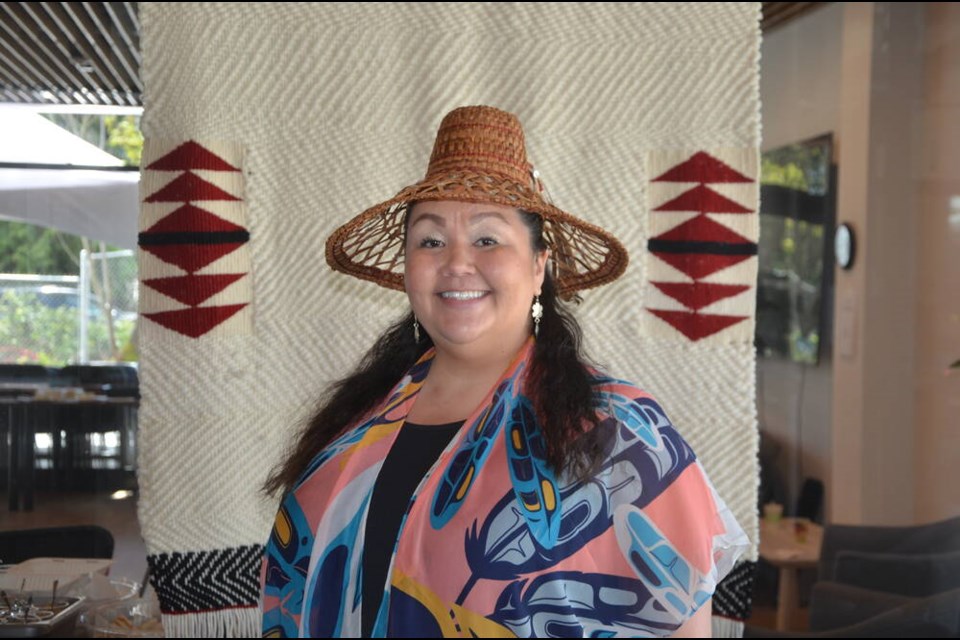A new (Capilano 5 reserve) has officially opened, marking one of the first housing complexes of its kind to be built on reserve land in Canada.
The S岣祑x瘫wú7mesh Úxwumixw (Squamish Nation) has opened the doors of Estítkw place, meaning "a safe place," on Lower Capilano Road.
The four storey subsidized complex is designed for Squamish Nation members, with priority given to women and children, people with disabilities, 2SLGBTQIA, people with mental health or substance abuse challenges, and people experiencing, or at risk of, homelessness.
“This building was created to bring our family members home,” said Holli Wilson, manager of the Nation's affordable housing organization Hiy虛ám虛 Housing, at the building’s opening ceremony on Tuesday.
“This is one of the very first projects of its kind in the country, welcoming our members home to the reserve, and it has been absolutely profound,” she said.
While the building officially opened its doors on Tuesday, it has housed members of particular need since November.
“We have welcomed home family. It has been absolutely critical to bring them home, for them to have a place to call home, and for them to feel loved and to be welcomed exactly as they are," said Wilson.
The complex has been designed to be more welcoming and accommodating than traditional supportive housing, said Wilson.
Elements of Coast Salish design have been woven throughout, from the cedar walls to the splashes of bright red on the building's edifice, the apartment doors and the walls within the units.
Alongside the 50 apartments, Estítkw place features shared facilities including a common room, outdoor area and dining space. An on-site chef ensures a steady stream of healthy cooked meals, often incorporating traditional fare like bannock, while supportive staff, described as "caretakers," are on site 24/7, she said.
“We’d like to bring in as many services as we can, especially when it comes to different modalities of healing," she said. "We’re looking at all the different counselling ... we’re looking at getting a new clinic that will bring in nurse practitioners, doctors and pharmacies. Our main thing is to keep everybody safe and everybody alive.”
Resident Richard Billy, who was among the first to move in in November, said the warmth that emanates from the building is unlike any other apartment complex – whether subsidized, supportive housing or otherwise.
“Living here is joyful,” he said. “You wouldn’t come here and think this is supportive housing."
Billy, who was forced to evacuate his Kelowna rental last year after his landlord decided to sell the home he had been living in, said there is a misconception that all people living in supportive housing complexes like Estítkw are suffering from addiction.
“Some of us are here because we just fell into a bit of bad luck,” he said. "What happened to me could happen to anyone, and if it wasn't for this building, I don't know where I would be."
After living in Kelowna for the previous 12 years, Billy said returning home to his roots, to Squamish land, has been like "taking a breath of fresh air."
A , published in January this year, found 83 per cent of those surveyed who do not currently live on reserve land indicated they want to return to Squamish territory. Housing, or lack thereof, ranked high as the barrier stopping them.
“This is the first time I’ve been on the reserve since I was eight and taken away," said resident Tanya McKay.
McKay, who was forcibly removed from her home and her family as a victim of the Sixties Scoop, said reuniting with her family on Squamish Nation land has been one of the highlights of living at Estítkw place. Learning the cultural traditions, language, dances and enjoying the food – especially the bannock – alongside other residents has built a sense of community and made the complex feel like home, she said.
McKay was made homeless last year after rising rent costs forced her to leave her former “stable home” of 10 years, she said.
“For a lot of people this is now their forever home, and it really feels as though we've been helped out," she said. "I haven’t felt this safe or secure in a long time.”
Mina Kerr-Lazenby is the North Shore News’ Indigenous and civic affairs reporter. This reporting beat is made possible by the .




